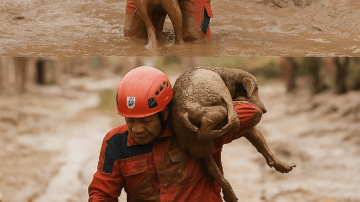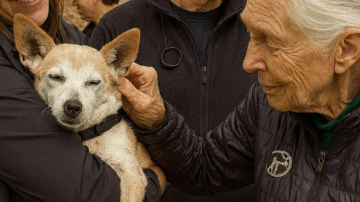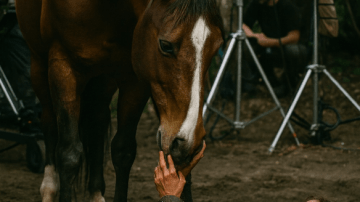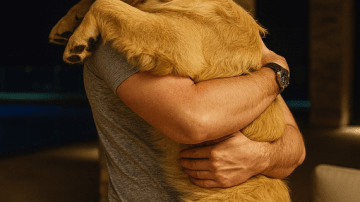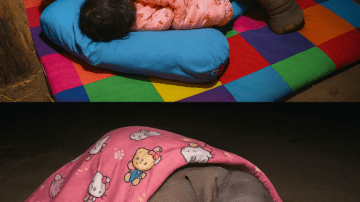When the rescue team received the call, their hearts tightened. A neighbor had reported a dog tied up and neglected on a remote farm. The rescuers were experienced, but even so, the thought of another innocent animal suffering filled them with dread. Could it really be true? Had Beike—the dog they thought had found a loving home—been abandoned again?

When they arrived, the sight shattered them. Hiding beneath a rusty machine, Beike trembled, his once-white fur dirty and tangled. He curled his body tightly, as though hoping he could disappear from the world. A wound on his leg was clearly visible, and his eyes were pools of fear. The happy, trusting dog they remembered was gone.
One rescuer crouched down, voice soft and breaking with emotion. “Beike… it’s okay. We’re here now.” He hoped Beike would recognize the voice, would remember the warmth they had once shared. But instead, Beike cowered further back, baring his teeth in desperation. Can you imagine the heartbreak of seeing a dog who once loved you now trembling with fear of your touch?
They stayed close, speaking gently, refusing to give up. They stretched out their hands, coaxing him, but the fear was too strong. Again and again, Beike retreated under the machine, refusing to trust. Whatever had happened since he had left their care had broken him deeply.

Finally, with patience and care, they managed to pull him out. His fur was matted with dirt, his body tense, eyes wild with confusion and terror. He snarled, his every muscle rigid. This was not the life they had wanted for him, not the second chance they had dreamed of. Beike was only a shadow of the dog he had once been.
Determined, they searched for the owner. After calling out for a while, a man appeared, his face annoyed, his demeanor dismissive. Beike shrank back immediately, too scared even to face him. When the rescuers demanded answers—how could he let Beike suffer like this?—the man merely shrugged. “He’s fine under the machine,” he said casually.
Fine. The word stabbed at their hearts. Beike was not fine. He was terrified, wounded, and betrayed. They pressed harder, trying to make him understand the cruelty he had inflicted, but the man only repeated, “He’s my dog. Mind your own business.”

The rescuers exchanged a silent look. They couldn’t leave Beike here, not one more day. Ignoring the man’s protests, they picked Beike up and carried him away. At the shelter, the first thing they did was remove the heavy leash that had dug into his neck and weighed him down for so long. Imagine carrying that burden day after day. Beike flinched as it came off, then sighed with relief, his body almost collapsing into the freedom.
They fed him gently by hand, whispering words of comfort. Yet inside, guilt gnawed at them. They had once believed Beike had gone to a good home, but they had been wrong. How could they have trusted someone so cruel?
After checking his injuries, they rushed him to the city animal hospital. There, the veterinarian immediately ordered a bath to clean his wounds. As the warm water flowed over him, Beike remained calm, almost relieved. But when they began to dry him, panic flashed in his eyes. He trembled, terrified, memories of past trauma surfacing all at once. They soothed him, stroking him gently, feeding him small bites of food to distract and comfort him.
When his thick fur began to part, the truth came into focus. The rescuers were horrified. Beneath the dirt and tangles lay deep, festering wounds. His neck was severely injured, the skin already decaying. Several other gashes stretched across his body, including one on his leg several centimeters long, and two smaller ones that looked like bite marks.
The veterinarian’s face darkened. These wounds were serious, dangerously close to a major artery. Without treatment, Beike’s neck could have rotted away completely. They sedated him, cleaned the infected flesh, and prepared him for emergency surgery. A drainage tube was inserted to help remove the pus and fluid. If they hadn’t brought him in now, he might not have survived.

The surgery went well, but Beike was fragile, barely hanging on. An IV delivered fluids, antibiotics, and pain relief, giving him the strength to keep fighting. He lay on the table, exhausted, but at last, safe.
On the second day, the rescuers visited him, praying for progress. Beike still looked wary, as if trust was a foreign memory. They brought him a bowl of food mixed with eggs, a treat he had once loved. He sniffed, hesitated, then took a few bites. Relief washed over them—it was a glimmer of hope. But after only a few mouthfuls, he turned away, his appetite vanishing. Their hearts sank. Had Beike lost the will to live?
The vet explained the reality. The infection in his neck was severe, making him weak and robbing him of appetite. He was also dangerously malnourished, his body too frail to heal quickly. Along with his neck wounds, he carried infections in his ears and legs. It would be a long, painful recovery.
On the third day, they tried again, this time with fresh meat. The rich smell caught Beike’s attention. He leaned forward and ate eagerly. For the first time, he finished his meal without hesitation. The rescuers smiled through tears—it was a small victory, but to them, it meant everything.
Slowly, Beike began to respond. When they called to him, he inched closer. When they offered snacks from their hands, he accepted, still wary but no longer recoiling. It was fragile, but it was trust beginning to grow again.
By the fourth day, his eyes looked calmer. He seemed to recognize them, his body less rigid when they approached. They gave him goat milk, nourishing his frail body and warming his spirit. Each sip felt like a step away from darkness.
In the hospital garden, the sun touched his fur, and for the first time, Beike lifted his face to the light. His tense body, once locked in fear, began to relax. When the rescuers hugged him, he leaned into their arms instead of pulling away. His eyes softened, a spark of trust and maybe even gratitude flickering within them. Tears filled their eyes. He was healing.
Day by day, Beike grew stronger. His bandages were changed, his wounds cleaned. Then came a moment that felt like a miracle: the doctor smiled and pointed out new skin forming over his neck wound. Beike was healing from the inside out. Soon, the stitches could come out, and he would be ready to leave the hospital.
But recovery is never without fear. One day, the doctor called with alarming news. Beike’s former owner had shown up at the hospital, demanding him back. Panic surged through the rescuers, but the doctor had refused, telling the man he had no right. Still, the encounter left its mark—Beike’s anxiety spiked, and he flinched again at the doctor’s touch. Slowly, with snacks and soft words, they reassured him that he was safe now.
On the eleventh day, the stitches were removed. It was a huge milestone, proof that Beike’s body was winning the fight. Two weeks after surgery, he was ready to leave the hospital. His wounds had healed beautifully, though he still needed care. At the shelter, they promised to protect him with the love he had always deserved.
A month later, Beike’s transformation was astonishing. He ran freely in the park, tail wagging, playing with other dogs. The emptiness in his eyes had been replaced with joy. He was no longer afraid. He knew now that he was safe, cherished, and loved.
Three months later, Beike was a new dog. His fur shone with health, his body was strong, and his spirit was full of life. The broken, trembling animal hiding under a machine was gone, replaced by a radiant soul who had overcome unimaginable pain.
Beike’s story is proof of the healing power of love, patience, and compassion. Even the deepest wounds can heal. Even the most broken hearts can learn to trust again. And sometimes, all it takes is someone willing to say, “You’re not alone anymore.”

